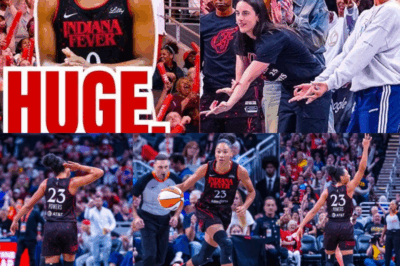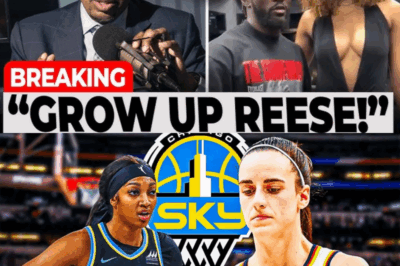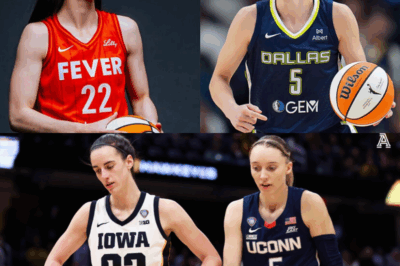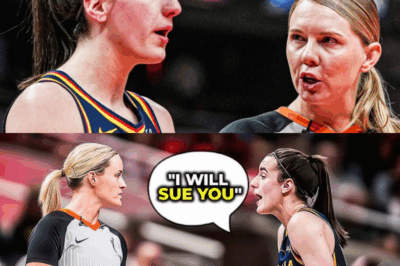The WNBA is under fire again, and this time the accusations are not about referees, playoff structures, or low ratings—it’s about something much bigger. A growing number of fans are accusing the league of openly discriminating against Caitlin Clark and other white star players, claiming the WNBA is intentionally downplaying their impact while promoting a narrative that favors others.

The issue has exploded across social media, sports talk shows, and even mainstream news outlets, sparking one of the most polarizing debates in women’s basketball history.
Caitlin Clark has been the biggest star the WNBA has seen in years. From her college dominance at Iowa to her immediate impact in Indiana, Clark has been the engine behind the league’s record ticket sales, TV ratings, and mainstream attention.
Yet, despite all the numbers proving her star power, there’s been a steady stream of media coverage and league-backed promotion that seems determined to shift the spotlight elsewhere. Many fans see this as deliberate suppression of Clark’s impact, raising the question: why is the WNBA so hesitant to embrace the very player who is keeping them relevant?
The numbers don’t lie. Games featuring Caitlin Clark routinely outdraw those without her, often by massive margins. Merchandise sales featuring her name eclipse those of nearly every other player in the league.
And yet, when the WNBA puts out highlight packages, promotional campaigns, or even media storylines, Clark is often minimized or left out entirely. Instead, the league appears to push certain players—sometimes even those with lower production, less star power, or weaker team success—while Clark’s contributions are treated like an afterthought. Fans are not imagining this; the evidence is piling up.
Adding fuel to the fire are recent WNBA playoff ratings. The second Clark was out of the picture, numbers plummeted across the board. Despite this obvious decline, the league has still attempted to frame their growth as “organic” and not reliant on any one player. To many, this is blatant dishonesty.

If a league hides how dependent it is on a single athlete, it raises questions about the motives behind such narratives. Why not simply celebrate Clark’s success as a catalyst? Why bury her impact unless there’s an underlying bias?
Social media has amplified these concerns. Clips of ESPN panels downplaying Clark’s performances have gone viral, with countless fans pointing out the double standard. When players like Angel Reese or A’ja Wilson have strong games, entire segments are devoted to their dominance.
But when Clark does something historic—whether it’s dropping 30 points, hitting logo threes, or breaking records—it’s treated as routine or dismissed as “just shooting.” This pattern has become impossible to ignore, and the accusations of bias have now transformed into accusations of discrimination.
This isn’t just about Clark either. Other white players, such as Sophie Cunningham, Sabrina Ionescu, and Paige Bueckers (soon to join the WNBA), are often criticized in ways that seem harsher than their counterparts. Cunningham’s fiery play is labeled as “dirty,” while others get praised for “passion.”
Ionescu, despite winning the 3-point contest and being a major face of the New York Liberty, has been nitpicked relentlessly while others are shielded from critique. Fans believe this is part of a broader narrative where the league elevates some players while actively resisting the popularity of others, and the lines appear to fall along racial divides.
The WNBA’s defenders argue this isn’t discrimination but rather a balancing act. They claim the league doesn’t want to become overly reliant on a single figure, especially one who entered with a massive college following.
They argue the WNBA must showcase multiple stars to survive long term. But that argument doesn’t explain why certain players are constantly uplifted while others are sidelined, even when performance, popularity, and metrics all favor the latter. If balance is the goal, then Clark and her peers should be at the forefront of every campaign, not shoved into the background.
What makes the accusations of discrimination more serious is the treatment Clark has endured on the court. She’s been the target of physical play far beyond what other rookies have faced. Hard fouls, elbows, and intentional body checks have been brushed off by officials and downplayed by commentators.

Many fans feel this is not only tolerated but almost encouraged, with media figures laughing it off as “welcome to the league” moments. If this were happening to another player, especially one the WNBA heavily promotes, would it be dismissed so casually? The double standard is glaring.
Even legends of the game have started to weigh in, some defending Clark and others indirectly validating the criticism. Lisa Leslie and Diana Taurasi have acknowledged her impact, while others, like Candace Parker, have called out the media for creating divisive narratives.
The split among former stars mirrors the growing divide among fans: is the league guilty of discrimination, or is this just the messy process of growing through new stars and shifting dynamics?
The danger for the WNBA is perception. Whether intentional or not, the league now faces a massive credibility issue. Fans believe they are witnessing a pattern of discrimination, and in the era of viral clips and real-time reactions, perception often matters more than reality.
If people believe Caitlin Clark is being mistreated, they will turn their frustration not only on the media but also on the WNBA itself. This could undermine the league’s biggest moment of growth in decades.
At the center of all this is Clark herself. Despite the criticism, physical punishment, and lack of league support, she has remained professional, focused, and determined to improve. Her calm demeanor in the face of so much adversity has only made her fans more loyal.
To them, she represents resilience and authenticity, the very qualities the WNBA should be promoting. And yet, the league’s actions—or lack thereof—keep reinforcing the narrative that she’s being held back rather than celebrated.
The bottom line is simple: Caitlin Clark is the most important player in the WNBA right now, and the league’s refusal to fully embrace her is costing them. Whether intentional discrimination or misguided strategy, the results are the same—fractured fanbases, declining ratings without her, and a cloud of controversy that overshadows the games themselves.
The WNBA must decide whether to stand behind the players driving its growth or continue playing favorites at the risk of alienating the very audience keeping them afloat.
If the league continues down this path, it risks turning what should be the Caitlin Clark era into a cautionary tale about how bias and politics ruined women’s basketball’s biggest opportunity.
Fans are demanding answers, players are beginning to speak out, and the media circus isn’t slowing down. Unless the WNBA changes course, the accusations of discrimination will only grow louder, and the damage could be irreversible.
News
FEVERS’ DESPERATE MOVE! The Indiana Fever uses Caitlin Clark as a mascot, cutting a WWE-style promo to boost ticket sales. The *move is seen as a desperate attempt to attract fans.
The Indiana Fever find themselves in a bizarre and desperate situation heading into the postseason. Despite the fact that they…
WNBA’S RATINGS SCANDAL! The WNBA is facing a ratings scandal, with allegations of hiding true numbers. The situation is unfolding, with many questioning the league’s honesty.
The WNBA has spent the past year telling the world that it’s booming, that ratings are soaring, and that fan…
FEVERS’ HUGE PLAYOFF WIN! The Indiana Fever dominate the Atlanta Dream, with Lexie Hull and Makayla Timpson leading the charge. The Fever send the Dream packing, with a decisive victory
The Indiana Fever are officially here to stay in the playoff picture, and they just made a massive statement in…
Stephen A Smith HUMILIATES Angel Reese After Her Latest STUNT! She’s No Caitlin Clark!.He humiliates Angel Reese after her latest stunt, comparing her unfavorably to Caitlin Clark. The criticism is scathing, with many agreeing with Smith’s assessment.
Angel Reese has never been one to shy away from attention, but her latest stunt has fans and analysts alike…
FEVERS’ TICKET SALES STRUGGLE! The Indiana Fever is struggling to sell tickets for their playoff game, with fans reacting to Paige Bueckers not being unanimous Rookie of the Year. The situation is concerning.
The Indiana Fever have fought all season to reach the playoffs, but just as the moment arrives, troubling news has…
WNBA REFS UNDER FIRE! Despite being in the playoffs, WNBA refs continue to miss easy calls, sparking frustration among fans and players. The inconsistent officiating is a concern.
It might be the playoffs, but the WNBA referees continue to miss easy calls. For fans who have followed the…
End of content
No more pages to load






Leave a Reply